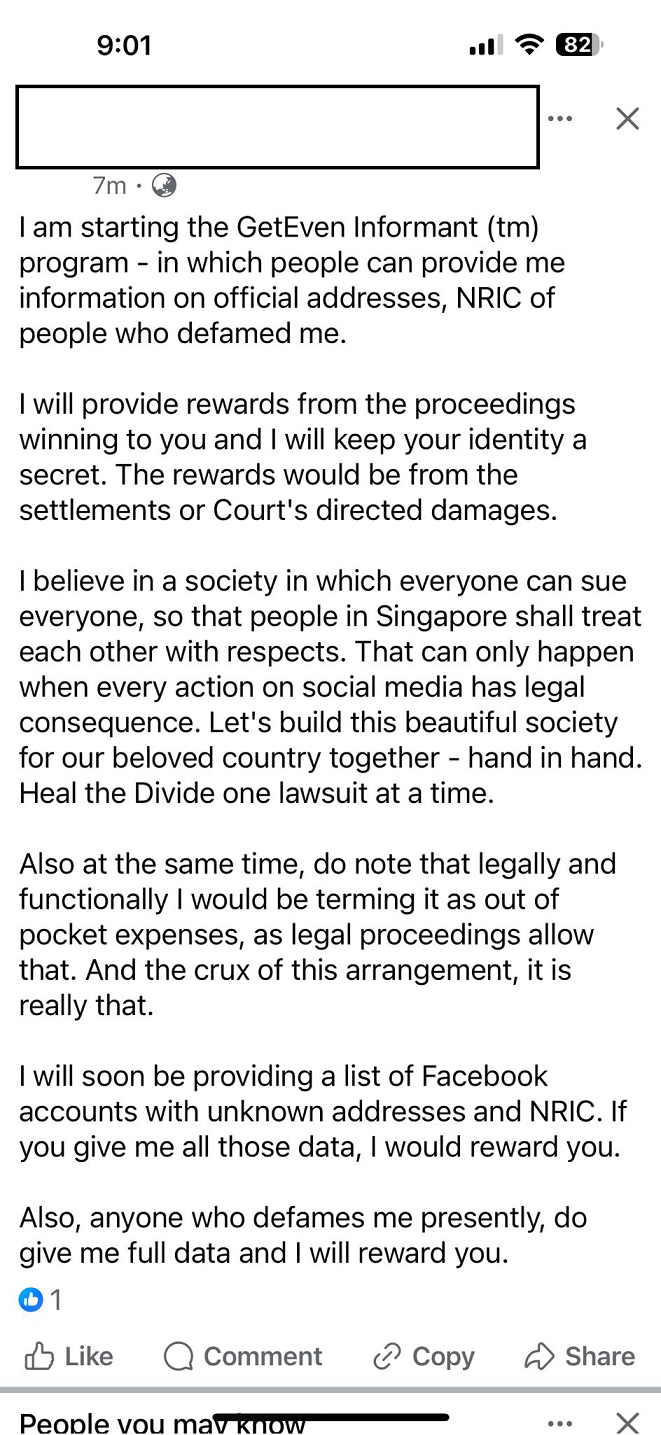Disclaimer: Opinions expressed herewith are strictly mine as a private citizen and has nothing to do with my employer, the National University of Singapore.
In view of an impending defamation suit, which I shall not speak about to not prejudice the case, I have come to learn some very important things about the legal system and about lawfare.
This was reported in the Straits Times several days ago: https://www.straitstimes.com/singapore/politics/tackling-lawfare-abusive-and-time-wasting-court-applications-to-be-deemed-contempt-of-court but I admit that I did not fully understand it then.
I have since come to learn more about lawfare and I have been gravely alarmed. I am thus writing this article to make sure that people understand what lawfare is about and how to protect themselves.
“Traditional” Lawfare
It has always been possible to use the law as a weapon. It was always possible to sue someone you didn’t like. All you need to have is money.
Why do people not sue willy nilly? That is because if you sue someone and lose, you will have to pay costs. Costs generally refers to the lawyer’s fees for the defendant. Of course if you win, you will get to collect both your costs and the damages.
Lawyers’ fees are v expensive, so most cases do not actually go to court. Instead they go to mediation, or are settled out of court.
What is the problem with the “old” legal system? Suppose some rich dude or a big corporation wronged you in some way and you wanted legal recourse, what would you do? You can hire a lawyer to sue.
But there are 2 challenges:
(i) Lawyers are expensive;
(ii) The counter-party is rich, so they will use some really expensive lawyer or SC. If you lose, you will lose your shirt.
Basically, the “old” legal system is not v accessible to most lay people. Most people simply cannot afford either (i) the cost of engaging a lawyer; or (ii) the risk of losing and paying huge costs.
Recent Legal Reforms
Singapore has had a very successful low-cost commercial dispute resolution platform called the Small Claims Tribunal for many years. It was thus thought it timely to introduce a version of the Small Claims Tribunal for civil matters.
The obvious way forward is to address the 2 known challenges:
(i) Aggrieved individuals no longer need to hire a lawyer. They can go to court and fight their case in person. These are called litigants-in-person (LIP);
(ii) Cap the costs that can be claimed according to a schedule so that we discourage the use of expensive lawyers by the party being sued to help “even the odds.”
How can this go wrong?
Asymmetric Warfare
Clearly if one is sued by a LIP, one can save money by also responding to the suit personally and also be a LIP. Unfortunately, this assumes that the defendant wants to defend himself/herself in court.
This is where life gets dicey: suppose one receives a defamation suit that one thinks is completely baseless, but one does not have time to go through the rigmarole of learning the law and conducting the defense personally, one can certainly engage a lawyer, but that’s going to cost between $50–70K and it is likely to take 18 to 24 months. What happens if you win? Because costs are capped, you can probably only recover $12K.
In other words, the situation forces the defendant to take up the suit in person or be stuck in a situation where you are going to lose at least $38K to $58K even before you start. In this situation, if one consults with a lawyer, the advice would be to “apologize publicly, offer to pay up a couple thousand dollars and settle,” and this would be the correct professional opinion.
If you ask me, I only have 3 words to describe this situation: 没天理 (no justice) and this is the situation I have since found myself! :-(
New Lawfare Defamation Business Model
It so turns out that this situation is actually a new business model! The way it works is that you trawl the Internet to find instances where people have said anything vaguely negative and you sue them for defamation. Because these are stuck in the above situation, they can choose to either (i) apologize and settle (and maybe pay $5–10K); or (ii) lose $38K to $58K. Which would you choose?
At some point, you run out of “prospects,” what would you do? Generate more leads!! How about we sue influencers and organizations that have a large number of supporters! If their supporters find out, get upset and post negative comments, more prospects!! How cool is that! Even better, sue the top girl school in this country!! The alumni confirm are plenty rich!!!
Another creative way is to pay for leads through a referral programme!

(For avoidance of doubt, I didn’t write this. Someone forwarded to me!)
I would like to give credit where credit is due: the person who came up with this scheme is a bloody genius (and he would probably consider “bloody genius” defamatory, except I don’t know who the hell he is, and so I certainly won’t know who I would be defaming!).
In Defence of Minlaw
Calvin Cheng has many harsh words against the system because he too is also in my boat, but I am more sanguine.
This clearly an abuse of the system, but the rich could also have abused the system in a similar way. A rich man could have made a baseless suit and caused significant hardship and suffering, even if a case had absolutely no merit; we have merely enabled evil poor people to do the same. Indeed, the legal system has become more accessible.
Suppose a blacksmith makes a knife that was intended for cooking, but some evil person decided to use the knife to stab worshipers in some temple or church, is it really the blacksmith’s fault? Perhaps to some extent, it is but some allowance for mistakes need to made when we try something new. That, is the nature of progress.
Another thing that many people might not have realized: this new defamation lawfare business model is only possible because of GPT! I suspect Minlaw did not truly understood the impact of GPT when doing the recent reforms.
Minlaw has since realized the potential dangers of abuse and hence introduced the recent lawfare law that I highlighted above. Basically after making the knife, the blacksmith will now check the buyer to make sure he/she has no criminal record.
I want to put on record my appreciation to MinLaw for the noble goals to making justice more accessible. It is certainly a move in the right direction. Instead of throwing out the baby with the bathwater, we should improve the system over time.
However, Lawfare Law Still Does Not Go Far Enough (and Will Likely Never Go Far Enough)
The new lawfare law criminalizes certain behaviours. This means that crimes would have been committed.
No matter how we look at it, someone would have been hurt by the time the law is activated. :-(
Basically, while we can check that the buyer of a knife is not a convicted criminal, can we truly be sure that he won’t go and stab someone with it?
No.
How can we try to make sure that no one gets hurt?
What we need is not just ID checks, we need to deploy security guards at the temples and churches so that the perpetrators can be stopped before someone gets hurt!
Thank you for the love and support
After I made the announcement yesterday that I was facing a defamation suit yesterday, I received a great outpouring of support from my many ex-students and friends. Thank you everyone!
There are people I don’t know who offered me money. I am so touched. :’-(
I am truly truly grateful.
While it is true that I am a poor prof, I also happen to be a poor prof with a number of rich and successful students.
I am grateful for the many offers from from my ex-students to contribute to my legal fees. I was too paiseh to accept.
I told my students, “Proffy is really touched, but I can handle this. I worry for the other victims who cannot handle it. How?”
One student said, “this is totally unjust! Let’s defend them!”
I said, “Sounds good, but who’s going to pay?”
“Here’s 5 BTC.”
It is one thing to claim to care about justice. It is quite another thing to put one’s money where his/her mouth is. I am truly proud of my student.
Defamation Lawfare Defence Fund
On this note, it gives me great pleasure to announce the setting up of a ~SGD600K (at this time) fund that we will henceforth use to help the victims of defamation lawfare. If you or someone you know is a lawfare victim, please contact Mr Darwin Gosal <getodd.legal@gmail.com>. Contact us and we will render assistance.
I am in the midst of discussing with my legal team exactly how we should be helping the victims. It is unlikely that we afford to hire individual lawyers to defend each and every victim. At $50–70K a pop, our funds would be drained in no time, and we still don’t know exactly how many victims are out there.
More details will be forthcoming but we are in the midst of assembling a team of both lawyers and volunteer CS students to provide advice and assistance to LIPs to file defence against the suits. We believe that only a combination of human-GPT assistance can we provide support in a scalable way. Volunteers who think that this is a worthwhile endeavour can also contact Darwin Gosal <getodd.legal@gmail.com> to offer your services.
Allow me to admit that we don’t fully know what we will do, but what is clear however is that we committed to try to ensure that the current victims do not suffer financial loss. Minimally, we are prepared to underwrite their losses if they should eventually lose their defamation cases (but again subject to confirmation after assessing the facts of the case). In particular, we are prepared to underwrite all the defamation cases arising from the sharing of the Rice Media article (you know who you are).
We hope that this should provide many of the current victims with a peace of mind. We have the war chest to fund our efforts and should our funds start running out, I will raise more.
Internally, we have also discussed restitution. We know that we can never fully compensate past victims for the emotional stress and anguish, but we would like to see what we can do to help. I would encourage all those who have already suffered loss from earlier lawfare defamation suits (i.e. settled and paid up) in recent times (last 3 years) to also get in touch with Darwin. There are no promises that we can afford to make restitution at this point (there might be too many of you and we might not be able to afford it), but we are serious about looking into it.
Conclusion
There is evil that walks among us.
A fortunate few like me and Calvin Cheng are only mildly inconvenienced; others suffered financial loss and great distress. One person has died.
This is grave injustice. I am very angry.
We do not have the powers to bring the evil-doers to justice; so we do what we can to protect those who cannot protect themselves. :-(
For justice and for country.
We cannot afford a second Geno.
I pray for our nation.
